
Find information on how to make a Protected Disclosure under the external procedures in place in the HEA.
Project Sponsor: Prof Lisa Looney (Vice President for Academic Affairs)
Project Lead: Dr Susan Hegarty
Reimagining undergraduate education
DCU Futures is the most ambitious innovation in teaching and learning in the history of Dublin City University (DCU). Funded by the Human Capital Initiative, this project re-imagines undergraduate education to empower students in a world defined by unprecedented technological and social change. The initiative aims to create capacity for over 1,000 additional students. The objectives of DCU Futures are to:
● Prepare students to thrive in an unscripted and complex world
● Adopt innovative pedagogical methods that address uncertainty and ambiguity
● Embrace DCU’s value system by seeking to transform lives and society.
DCU Futures
DCU Futures is structured around three pillars – what students learn, how students learn, and embedding transversal skills.
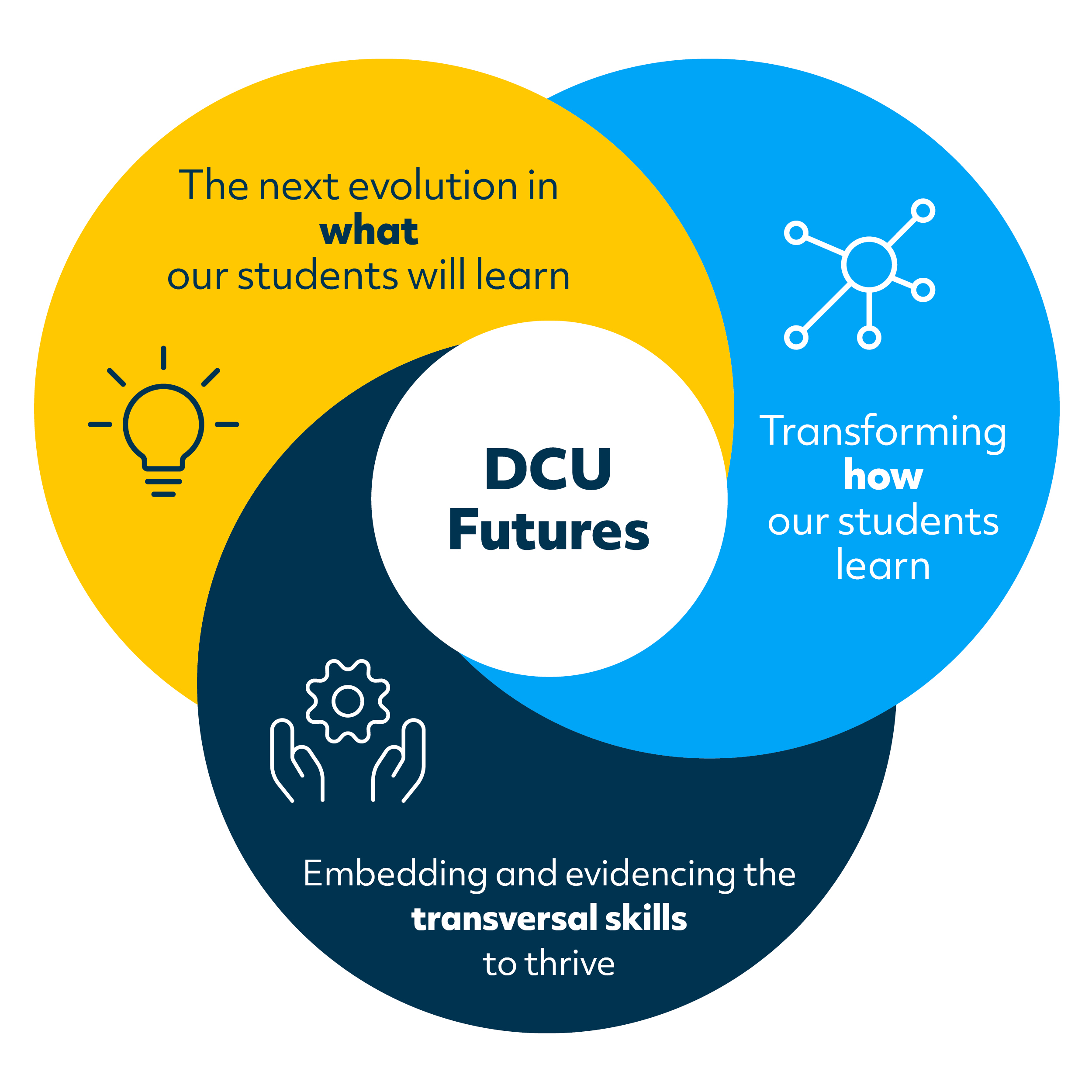
Evolving what our students learn
Since 2021, DCU Futures has launched ten new undergraduate degree courses and specialisms, informed by consultation with enterprise partners and with reference to national strategies e.g. Future Jobs Ireland 2019, National Skills Strategy 2025.
Transforming how our students learn
DCU Futures represents an investment in innovative pedagogies, including challenge-based learning (CBL), engagement with industry, immersive learning experiences, online learning, and virtual laboratories. Support for the development and implementation of these innovative pedagogies is led by the Teaching Enhancement Unit, with support for blended online delivery led by DCU Studio.
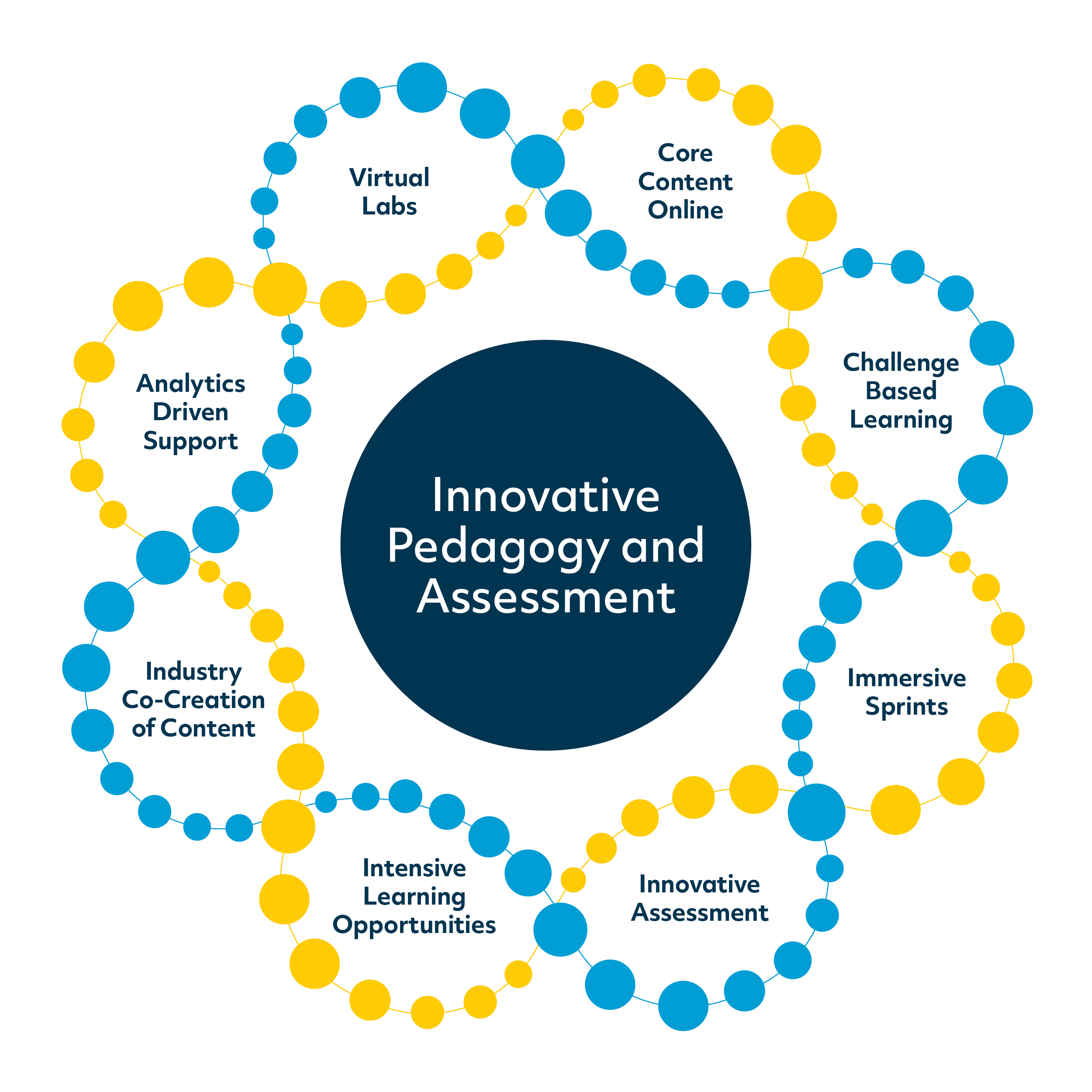
Embedding and evidencing the Transversal Skills to thrive
With more frequent career mobility, transversal skills are those that can be used across a wide variety of work situations and are vital to graduate success. Through a process of unprecedented collaboration, DCU Futures has architected a unique Transversal Skills Competence Framework, ensuring that these skills are embedded in a rigorous and transparent way across programmes. As part of this, all students undertake an innovative module on Data Literacy and Analytics, and can study five different languages at varying levels.
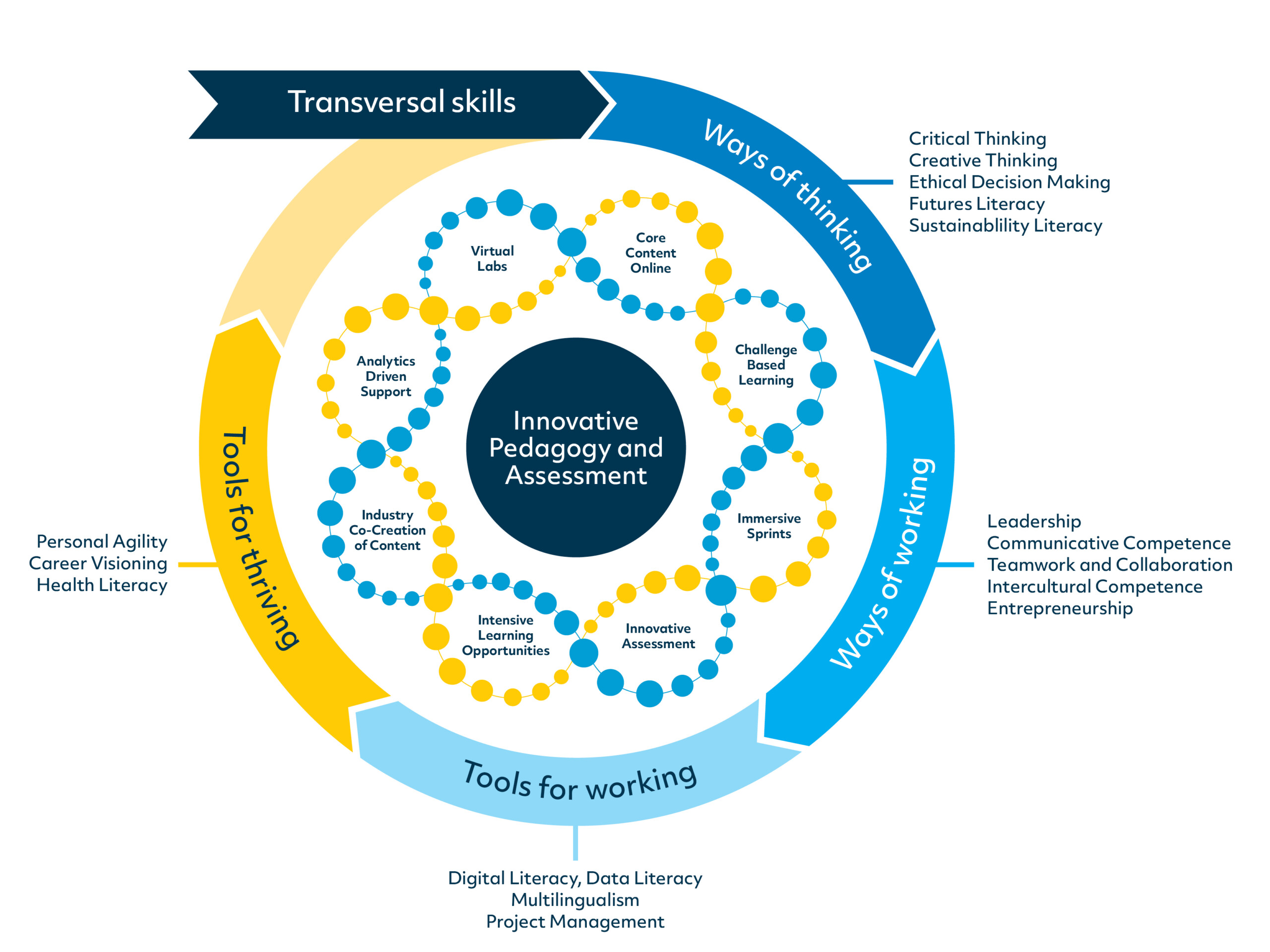
Transversal Skills
A critical aspect of DCU Futures is providing students with the opportunities to develop their competencies in a range of transversal skills. In the development of our transversal skills competence framework, the project has engaged with a number of international collaborators for refinement and validation. For example, in the development of the Futures Literacy transversal skills, we have collaborated closely with two UNESCO Chairs, Dr Maya van Leemput (Erasmus Brussels University of Applied Sciences and the Arts) and Dr Loes Damhof (Hanze University of Applied Science).
Student-Enterprise Collaboration
Our students are engaging directly with a number of diverse external stakeholders. For example, students in first year of the Global Challenges programme have engaged with SmartDublin and participated in the Postcards from Dublin initiative. Students in the Climate and Environmental Sustainability programme are engaged on a multiyear basis with the Dunsany Rewilding project, whilst students in Bioprocessing are working closely with Alltech in Dunboyne. Students studying in Climate and Environmental Sustainability are working with industry partners to explore potential solutions to the current housing crisis, whilst students studying in Psychology and Disruptive Technologies are exploring food and housing insecurity in university students, and Global Challenges students are participating in the “Where there is no Engineer” (WTINE) design challenge. This year the challenge is to design solutions for a community in Tamil Nadu, India, and this is in association with Friends in Need, India.
International Pedagogy Advisory Panel
The International Pedagogy Advisory Panel (IPAP) plays a key role in the transformative ambition of DCU Futures and is a key part of the bespoke rolling accreditation process. The core purpose of the panel is to explore, examine and recommend innovations in pedagogy across DCU Futures programmes, with the aim of enhancing students’ learning experience. They are also advising on embedding these pedagogical developments and assessing their impact over the next four years, with meetings happening twice per year until March 2025.
European Consortium for Innovative Universities (ECIU)
DCU is a partner institution in the European Consortium for Innovative Universities (ECIU), and Challenge Based Learning (CBL) is one of the signature pedagogical approaches being implemented across the project and university. We have worked closely in particular with the University of Twente, who are also world leaders in CBL, to develop a framework for CBL in DCU at module level. Additionally, we have collaborated with colleagues in Twente to develop and deliver challenges within our DCU Futures programmes that have participants from across the ECIU network, particularly in the BSc in Psychology and Disruptive Technologies.
Institutional Partnerships
Our growing collaborations with international partners is also creating opportunities for students and for us to experience and explore best practice in those institutions. These include collaborations with Notre Dame (USA), Utrecht (Netherlands), Tampere (Finland, BA in Climate and Environmental Sustainability) and Babson College (BSc in Digital Business and Innovation), as well as engagement with members of the international pedagogy advisory panel (UK, Netherlands, Mexico) and ECIU partner institutions (Spain, Denmark, Germany, Lithuania, France, Finland, Sweden, Portugal, Norway, Italy, Netherlands). The DCU Futures programme, BA in Climate and Environmental Sustainability, for example, has successfully secured Erasmus+ funding, in collaboration with Utrecht University (the Netherlands) and Tampere University (Finland), to develop a blended intensive programme for students in all three countries. This programme involves firstly a virtual component that is currently being delivered to all students prior to students undertaking a physical mobility component. The physical mobility component will comprise a sustainability-based field trip for 5-7 days in April 2023 involving students from all three programmes. Students across all programmes are working collectively and simultaneously on assignments that are recognised as part of their individual degree programmes.
External Stakeholder Engagement Forum
The External Stakeholder Engagement Forum (ESEF) embeds the voice of external partners, including industry, professional and societal bodies, in all aspects of the student learning experience related to DCU Futures (and e DCU Micro-Credentialing project). The aim of ESEF is to provide direction for the implementation of these strategic initiatives, advise on enterprise collaborations for curriculum development, and review the impact of enterprise engagements in line with the University’s strategic objectives. The 12 member forum brings together external enterprises (Microsoft, Intel, Alltech, Accenture, Skillnet, Ibec, Mindseed Consulting and Optimum), internal stakeholders (Director of Micro-Credential Strategy & Innovation, Executive Director of Engagement and Educational Trust representative) and is chaired by the Dean of Strategic Learning Innovation.
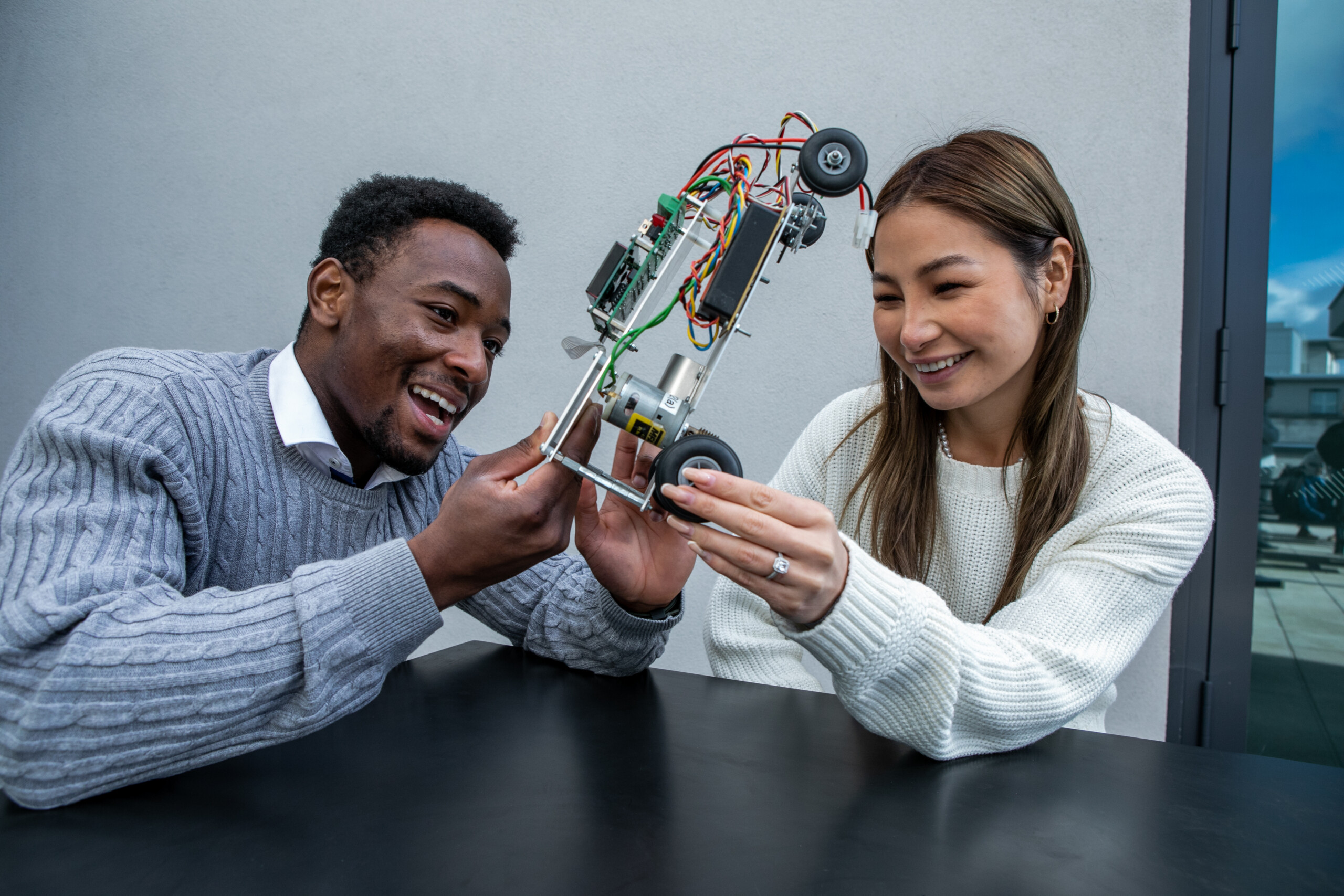
Working with our students
Over 350 students are now pursuing DCU Futures programmes or specialisms. Engagement directly with them is central to our approach. One of the ways this happens is via the Student Summit which is held towards the end of each semester. Two representative students from each of the ten DCU Futures programmes are invited to attend this in-person meeting. The summits are run in a workshop format that allows students to provide active feedback and participate in group discussion regarding their programmes.
Virtual Labs Working Group
The DCU Virtual Labs Working Group (VLWG) is convened on foot innovations in virtual laboratories enhancing hands-on practical laboratories across STEM. The purpose of the workinggroup is to share and develop best pedagogical practice on the design, development and implementation of Virtual Laboratories across DCU. The group brings together 14 experts across 8 schools and 4 units to evaluate innovative approaches to teach students in a virtual laboratory environment. This group also hosts the DCU Virtual Labs Seminar Series, and captures module and student-specific data to understand content being implemented and potential benefits to student learning.
Outreach
All DCU Futures programmes have admission pathways from Further Education, and are situated within DCU admissions processes that facilitate a diversity of intake. Due to the innovative nature of the DCU Futures programmes, a number of the new programmes have attracted mature students. Additionally, DCU Futures programme teams have been proactive in relation to outreach to potential Access applicants, and participated in the DCU Access workshops throughout March2022. The workshops were attended by transition year students from local DEIS schools to help increase interest in STEM related courses, careers and the Future programmes, reaching about 200 students for the workshops. The workshops involved hands-on problem solving tasks that can be related to tangible real world problems as a way to allow students to envisage themselves undertaking STEM courses, careers, DCU Futures programmes etc. We have also successfully recruited HEAR and DARE students across a majority of our DCU Futures programmes.
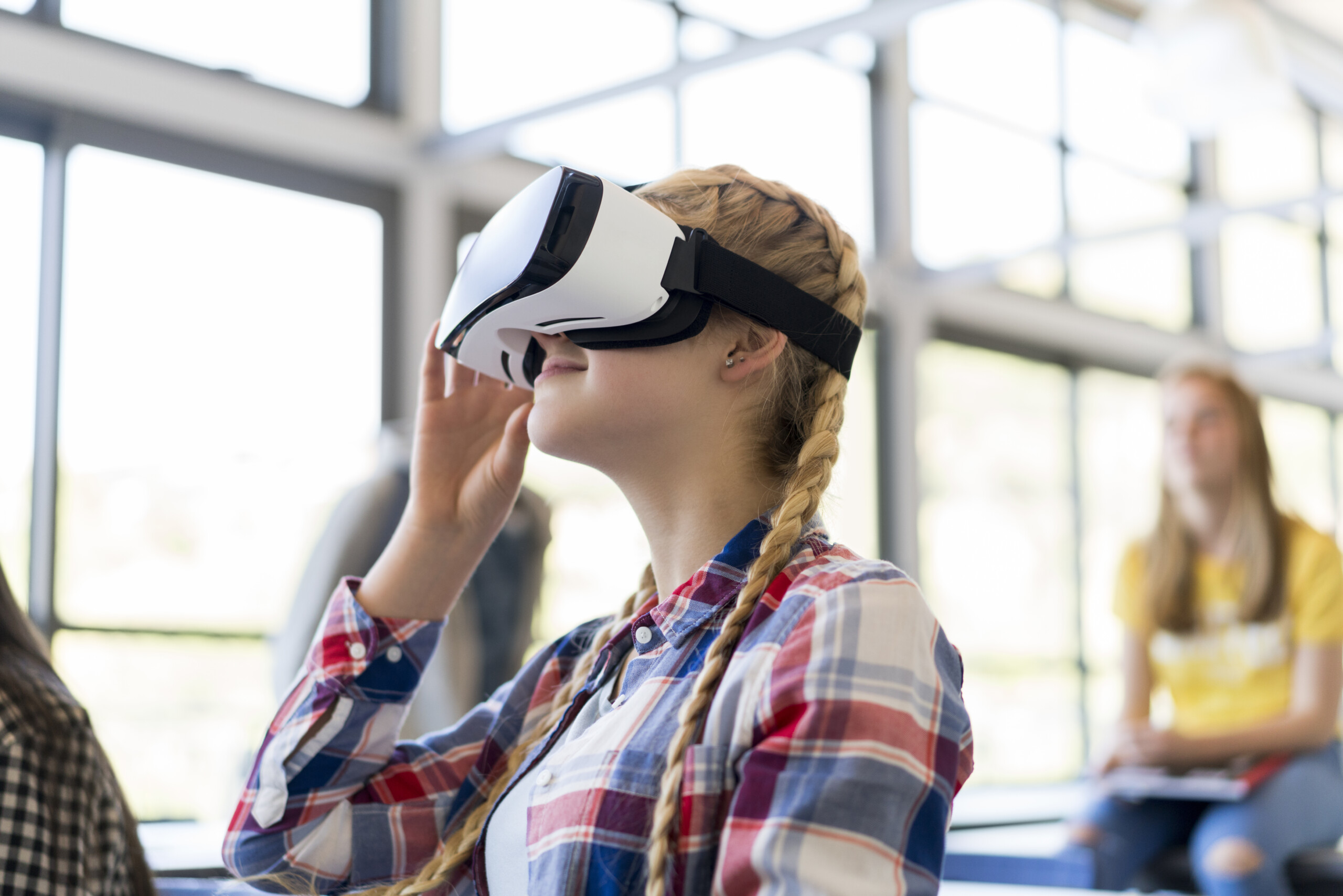
Key enterprise engagements
DCU has a longstanding institutional commitment to both graduate employability and enterprise engagement. DCU Futures builds on these themes, where enterprise partners are integrated in the co-creation, co-delivery and co-assessment of student learning in all 10 DCU Futures programmes and specialisms.
Discipline-Enterprise engagement
DCU Futures has agreed an enterprise engagement framework with named enterprise partners including:
● Key enterprise partners: Accenture, Alltech, Intel, Microsoft and Prometric/CARPE
● Discipline-specific collaborations: FastNet Consulting, Wacker (Switzerland), Biocompetence centre (Switzerland), EirGrid, GridBeyond, NEXsys research project, ESB, National Standards Authority Ireland (NSAI), ReDiscovery Centre Ballymun, Fingal County Council, Department of Foreign Affairs, Minerex Environmental ltd, Dunsany Estate, Irish Residential Properties REIT plc, Rowan Engineering, Native Events, RPS Consulting, Codema, SmartDublin and SmartDCU, Engineers Without Borders Ireland.
By co-developing programme curriculums with enterprise, industry specific knowledge focus and emerging industry skills needs were identified. Enterprise co-delivery and co-assessment has incorporated challenge-based hackathons, learning resources, virtual/augmented reality (AR) learning and industry relevant case studies. Discipline-enterprise projects in development include incorporating sustainable development goals in organisational culture, co-development of capstone final year undergraduate research projects, placement, internship and mentoring of students by industry members.
Student-Enterprise engagement
Student’s have benefited from extensive enterprise-student interaction points throughout their programmes, including industry placements, guest lectures, challenge based learning projects, hackathons, and design sprints/case studies. To date, all first year students on DCU Futures programmes and specialisms have participated in enterprise challenges e.g.
● Hackathon exploring the potential impacts of Artificial Intelligence
● Datathon in in psychology and disruptive technologies with Accenture
● Programming hackathon in data analytics with Accenture
In year two of the DCU Futures programmes, the challenges are increasing in sophistication and level of co-creation with industry partners, with challenges in development including
● Housing hackathon with Irish Residential Properties REIT (IRES)
● Life cycle assessment and decarbonisation with Intel
Website
● DCU Futures
● New Undergraduate Courses
● Digital Maker Space
● DCU Futures Digital Business & Innovation students on Unibuddy
● DCU Futures Climate & Environmental Sustainability students on Unibuddy
Social media
X
YouTube
Podcasts
TikTok
Conferences
Presentations delivered at:
Workshops
Media
Events
Achievements
Last updated: November 2024